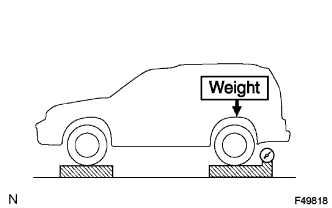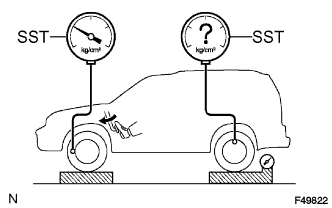Load Sensing Proportioning Valve -- On-Vehicle Inspection |
| 1. CHECK LOAD SENSING PROPORTIONING VALVE ASSEMBLY |
Set the vehicle to its curb weight.
 |
Place weights (as necessary) on the rear deck until the rear axle load is as shown below.
- Standard rear axle load:
- 9,808 N (1,000 kgf, 2,205 lb)
- NOTICE:
- Be sure that the vehicle is on a level surface before starting the procedure.
- When placing the weights on the vehicle, place approximately 60 kg (132 lb) above the specification first. Then remove weights as necessary to adjust the load.
Set SST, and bleed air from the brake system.
- SST
- 09709-29018
 |
Raise the front brake fluid pressure to 10,000 kPa (102 kgf/cm2, 1,450 psi) when the brake pedal is depressed, and check the rear brake fluid pressure.
- Standard rear brake fluid pressure:
- 3,700 +-640 kPa (37.7 +-6.5 kgf/cm2, 536 +-93 psi)
- HINT:
- The pedal should not be depressed twice or released while the specified pressure is being set. Read the value of the rear pressure after adjusting and holding the specified brake fluid pressure for 2 seconds.
 |
| 2. ADJUST LOAD SENSING PROPORTIONING VALVE ASSEMBLY |
Loosen the lock nut.
 |
Adjust the rear brake fluid pressure by changing the length of "A" or "B".
For lower pressure - Lengthen "A" or "B"
For higher pressure - Shorten "A" or "B"
- HINT:
- The rear brake fluid pressure changes according to the table below by adjusting the length of "A" or "B".
- Reference:
For one turn of adjusting nut For 1 mm (0.04 in.) of "B" length 220 kPa (2.2 kgf/cm2, 32 psi) 70 kPa (0.7 kgf/cm2, 10.2 psi)
Tighten the lock nut.
- Torque:
- 12.7 N*m{130 kgf*cm, 9 ft.*lbf}